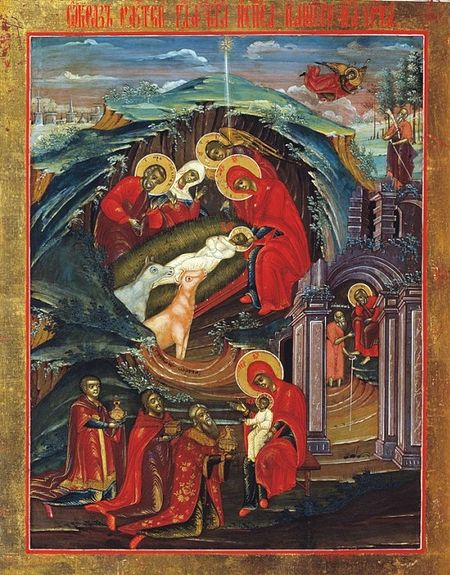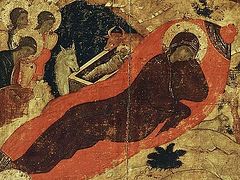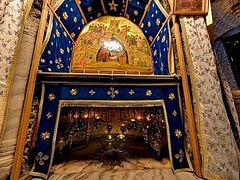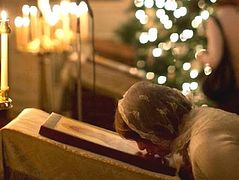A few days before the great feast of the Nativity of Christ we talked with Archpriest Valerian Krechetov, a famous confessor and preacher, and rector of the Church of the Protection of the Mother of God in the Akulovo village near Moscow. The subject of our talk was: How can we prepare ourselves to experience the great Christian feasts more attentively?
—Father Valerian, the vanity of this world and the hectic lifestyle prevent us from paying attention to the events and people that are “flying past” like a whirlwind and don’t leave us any chance of looking into our souls more closely. To our great shame, we have to acknowledge this just before the most important Church feasts, when despite our efforts we feel powerless to change anything within ourselves in order “to swim with the tide of Divine grace” and feel “the joy inexpressible”, as it was in our childhood.
—The point is that Church services are of primary importance in our Orthodox Church. As the New Martyr Sergei Mechev used to say, Church services are an “outside of this world” sacrament – a sacrament that is performed both in the Church Militant (on earth) and the Church Triumphant (in heaven). The famous feast of the Protecting Veil of the Mother of God is visible evidence of this truth: The Most Holy Theotokos appeared in the Church of Blachernae and, together with all the gathered worshippers, offered up Her prayers for all who prayed in the whole world. A fine example is St. Seraphim of Sarov, who once beheld the Savior Jesus Christ Himself, surrounded by the Heavenly Bodiless Powers, after the Small Entrance during the Liturgy. Another example is St. Sergius of Radonezh, whose disciples saw angels concelebrating the Liturgy with him. And there are lots of other similar examples, when it was revealed to people that celestial dwellers were serving with them. All these numerous examples are testimony to the fact that the celebration takes place both at the earthly Liturgy and the heavenly Liturgy simultaneously. That is the most significant and essential moment in our Orthodox faith!
—Thus, it means that Church services are of primary importance to us?
—That is right. Furthermore, all that happens in our life on earth is above all related to its spiritual side. As St. Ambrose of Optina used to say, we must look at all things through the lens of eternity. More than that, only then and this way will we begin to understand all events of our life properly.
—But how can we come to the right, spiritual view of things happening on earth?
—Of course, we are not above Apostle Peter to whom Christ said, What I do thou knowest not now; but thou shalt know hereafter (Jn. 13:7). There is a widely known aphorism that “marriages are made in Heaven”. It testifies to the same fact, that in this material world we observe only fragments of what is done and exists in heaven “in its fullness”.
—Fr. Valerian, can you possibly provide some concrete example of this, please?
—There are countless examples bearing testimony to this truth. By the Lord’s providence I was privileged to associate with the reposed Vladimir Petrovich Sedov. He was distantly related to the Holy Metropolitan Philaret (Drozdov) of Moscow. One day the saint appeared to Vladimir when he was awake and conversed with him for about an hour. The metropolitan said an interesting thing to him: “Thanks to your abstinence the Lord has saved you from death on many occasions.” (It should be mentioned that Vladimir from his childhood abstained from meat, wine and other alcoholic beverages, even from tea and coffee, and never smoked). This man truly experienced extremely difficult life situations. For example, as a doctor he was sent to the areas affected by plague and cholera epidemics on a hospital train many times. And, as Vladimir himself told me, at times it happened that all the train cars were bombed and only two remained whole (and he was travelling in one of them). St. Philaret said to him: “Do you think these were just coincidences? No, they weren’t! I have been watching over each step of yours since you were born!”
—Yes, that is an amazing story! Many Orthodox believers have experienced such phenomena. However, we tend to forget them or describe them as “mere coincidences”.
—Indeed the spiritual world influences the material world! And how many miracles of this kind occurred during the Second World War! In many cases people heard voices telling them to walk away immediately. People would move away and just then a shell would fall on the very place where they had been standing a few moments before, and they would certainly have been killed by it. This is true evidence of a living and permanent interaction between the two worlds – the visible and the invisible ones. And what we see with our physical eyes is, as it were, “the tip of the iceberg”, whereas the real depth is not revealed to most of people.
—Therefore, the true meaning of what takes place in the Church is beyond the comprehension of most people, isn’t it?
—All that happens in the Church is done in the invisible spiritual world. But in the material world we do not come to understand it immediately, and only few of us succeed in this because the rest of us are preoccupied by this-worldly things.
—Let us take the Birth of Christ as an example of such event.
—The example of the Nativity of the Savior is remarkable… Jerusalem and all its surroundings were in deep sleep, only the shepherds were awake. And at that very moment the greatest sacrament was performed – namely, the Birth of the Son of God, the Nativity of Christ. Theses glad tidings were proclaimed to people by angels. Who were the first recipients of the glad tidings? The shepherds...
—But the Magi, the wise men from the East, followed the star, came to Bethlehem, and fell down and worshipped the newborn Infant God, too.
—Yes, a remarkable parallel is drawn here… Shortly before the great event the Magi, the wise men from the East (scientists of the age, as it were), spotted some unusual celestial body – a star that suddenly appeared. They realized that some extraordinary event was taking place and it was in the invisible world. What was it? I believe it was the Annunciation! They saw the star from afar, and they followed it and it took them a long time to reach the destination. And they finally arrived to Jerusalem (by the way, it is a fine symbol of science), and as wise men they came to the conclusion that something was going to happen near Jerusalem. But what?
Today there are some scientists who have not yet come to believe in God and who claim, “yes, there is something out there.” And they are often afraid to use the word “God” at this. There is an excellent aphorism, though I don’t know its author: “The last word in science is the first word of the Bible.” Thus, when the Magi reached Jerusalem and began asking people, Where is He that is born King of the Jews? (see Mt. 2:2), the scribes explained them that it was due to happen in Bethlehem of Judea. Thus the Magi, the wise men, were then guided from Jerusalem to Bethlehem, according to an Old Testament prophecy… So where did they finally arrive? At the place where the shepherds had come before them, informed of the Birth of the Savior directly by angels!
—So the Lord preferred to reveal Himself to ordinary, unschooled men first?
—This is what actually happens in our life too: simple-hearted people are keenly aware of the power of the spiritual world. With our common vanities and secular cares, we often forget that something very important is happening in the world. The more that hustle and bustle overshadows our spiritual life, the more difficult it is to sense things above. And here are the Savior’s words about the end times: They did eat, they drank, they bought, they sold, they planted, they builded (Lk. 17:28) – that is, the people will be busy with all these things while the Judgment Day will be nearing.
—By the way, lately there has been a lot of fuss in the press about the so-called “doomsday”, or “the end of the world”, to be more exact [it should be reminded that many people across the globe waited for “the Mayan apocalypse” around December 21, 2012; their apprehensions were based on some ancient calendars of the Maya peoples that had once inhabited parts of Central America. Of course, “the end of the world” did not happen. This interview was taken in early January 2013, when the memories of the debate were still alive – trans.].
—Amazingly, God’s providence was revealed through this commotion, which, however, can make any sincere Orthodox believer smile! The Lord has obviously allowed this naïve discussion to happen (I mean the naivety of calculating “the accurate date of the end of the world”). But this confusion has been a reminder that the end will come sooner or later! And, given the vanity of our days, that looked really ridiculous: some chose to stock up on food “for future use” (as if food would have helped them after “doomsday”), while others made money because of their customers (as if money would have been of use after “the last day”). Thus, the actions of both these groups of people were pointless! But, amazingly, there were also some people who began to think of life more seriously and decided to repent. Perhaps this was the only advantage of the entire story of “the end of the world”. Though, of course, we should remind people about the Judgment Day! And we need to bear in mind that many of us will have departed this life long before that “end”. Nobody can avoid the end of his life on earth. Whatsoever thou takest in hand, remember the end, and thou shalt never do amiss (Eccl. 7:36 KJV). It is perhaps for this precious memory of death that the Lord allows these signs (naïve as they are) to come: He reminds us that this life is temporal and eternity awaits us.
—But very soon we are to meet the radiant feast of the Nativity of Christ.
—Unfortunately, in the Christmas Eve bustle we sometimes forget the main thing – the joy of the coming Birth of Christ. Unlike adults, children are always excited about Christmas. In some sense it is a children’s festival so they feel its magic in particular. Maybe their attitude towards the Nativity is childlike, but what is wrong with it? For example, parents have trained their kids to fast, and now they will be able to break their fast and eat absolutely all kinds of food while all are celebrating – isn’t it wonderful for kids? True, their joy is childish, but we also say “a great comfort for the brethren” in reference to monks. There is nothing wrong with it, for our Lord ate and drank Himself, He was present at a wedding in Cana of Galilee and fed all those who were listening to His sermons. So, concern for food and entertainment of others is quite normal. Not without reason is it said that “if the body suffers, then the soul suffers with it” (perhaps an allusion to 1 Cor. 12:26); likewise, if the body rejoices, the soul rejoices with it. And it is also said: “Rejoice, soul and body!” After all, these two entities – the physical and the spiritual ones – are interrelated. That is natural, given the integrity of human nature.
But there is only one sad thing: Both the body and the soul are clouded with sin so that our joy can never be full… Someone gets frustrated, someone bears a grudge against others… And our enemy often strives to disturb our peace of mind. It is a common occurrence: on or just before great Church festivals people may experience temptations as the evil one seeks to make us quarrel with our nearest and dearest and lose our integrity. After all, this is a diabolical concept: “divide and rule”. Meanwhile the Lord says, That they may be one, as we are (Jn. 17:11). For the joy of the feast increases through shared joy. There is a fine dictum, “A sorrow shared is halved, a joy shared is doubled”.
Such brilliant maxims of ordinary Russian people are very edifying, and they are often based on texts of the Holy Scriptures.
—What is the spiritual joy of the feast like?
—It is the joy of which Jesus Christ said that …Your joy no man taketh from you (Jn. 16:22). It is the joy that Apostle Paul wished to everybody, saying, Rejoice evermore. Pray without ceasing. In every thing give thanks (1 Thess. 5:16-18). This joy allows us to take joy from the feast already in this life, in expectation of the bliss of the life to come. By the by, even Johann Wolfgang von Goethe said, “He who does not believe in an afterlife is dead for this life.” And he who lives for the sake of the life eternal will have joy both in this life and in the life to come! But if someone is unhappy throughout his life here (is tormented by envy, anger, etc.), then he will find relief neither in this life nor in afterlife. We are very sorry for such people…
—Perhaps we can feel nthe joy of the feast by attending Church services during the weeks preceding the festival?
—The joy of the oncoming feast is marked by our Orthodox services. How wisely and beautifully the Typicon (the liturgical rules for the whole year) is arranged! The Holy Church hastens to make Christians happy in good time – this day or period is called forefeast. When the joy of the feast comes, the Church is not in a hurry to part with it – afterfeast exists for this purpose. The greater the feast, the longer periods of its forefeast and afterfeast.
For instance, the Dormition Fast is so wonderful, and it lasts only two weeks. When is it observed? The Mother of God is very merciful, because She is our Mother! Already on the first day of Her fast She gladdens our hearts by the blessing of honey. It is followed by “the Savior of Apples” [the Russian folk name for the Transfiguration of the Lord.—Trans.]…
And scarcely has the Nativity Fast begun when the Holy Church starts singing at services, “Christ Is Born, glorify Him!” And later through the Nativity Fast we sing it at every Sunday Liturgy, “Christ Is Born!” This has something in common with the Paschal exclamation, “Christ Is Risen!” When we celebrate Pascha, the Resurrection of Christ, the Easter season lasts forty days and every day we hear, “Christ Is Risen!”, “Christ Is Risen!” And in the period preceding the feast of the Nativity we hear at the Church, “Christ Is Born!”, “Christ Is Born!”
—And the Nativity of Christ is preceded by the Sunday of the Holy Forefathers and the Sunday of the Holy Fathers.
—That is very natural: to whom should we express our deep gratitude? To those who brought this joy to us, who preserved this truth and handed it down to us. What is this? It is an immediate line of continuity from the Forefathers and the Fathers. It is the tradition of the Church that was passed down from generation to generation up to our times. This continuity has been maintained. There are the Forefathers and the Fathers of our generations just as there were the Forefathers and the Fathers before the Birth of Christ. It signifies our generational succession and teaches us to show reverence for the people who have preserved this truth for us.
“Holy Russia, keep the Orthodox faith, on which you became firmly established” (from the Stichera to the Saints of Russia).
I wish a happy great feast of the Nativity of the Lord to everybody!









